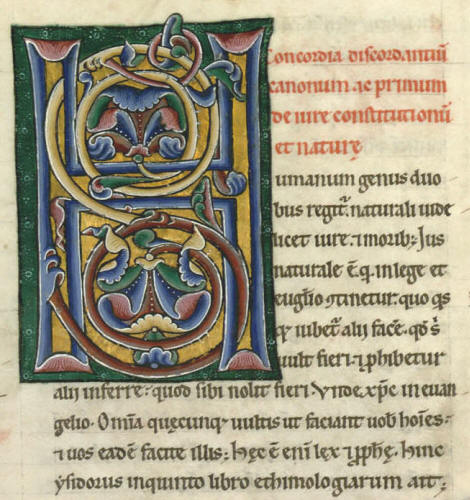
Gratian, Decretum ca. 1150-1160
Grenoble, Bibliothèque muncipale 34, fol. 8v
Martha Keil, "What Happened to the 'New Christians'? The Viennese Geserah' of 1420/21 and the Forced Baptism of the Jews," Jews and Christians in Medieval Europe: The Historiographical Legacy of Bernhard Blumenkranz, edd. Philippe Buc, Martha Keil, and John Tolan (Religion and Law in Medieval Christian and Muslim Societies 7; Turnhout: 2016) 97-114
Pope Gregory I (†603), Council of Toledo 633): Distinction 45, canons 3,4,5: Validity and Rules of forced conversions, Baptisms
Pope Gregory I (†603), Council of Toledo (589): D. 54, c.13, 14, 15: Jews cannot have Christian servants or hold public office
Council of Toledo (633), Pseudo Pope Gaius: Causa 2 quaestio7 c.24, 25: Relapsed Jews cannot testify against Christians
Council of Toledo (633): C. 17 q.4 c.31: Jews cannot hold public office
Council of Toledo (633) (693*), Council of Agatha (506): C.28 q.1 c.10, 11, 12, 13, 14: Jews cannot marry Christians; if they do they must convert; Christian children must be removed from Jewish parents; Jewish converts to Christianity must not live with Jews, Christians may not marry Jews
Pennington, “Gratian and the Jews,” Bulletin of Medieval Canon Law 31 (2014) 111-124
Benjamin Zeev Kedar, "The Forcible Baptisms of 1096: History and Historiography," Crusaders and Franks: Studies in the History of the Crusades and the Frankish Levant, ed. Benjamin Z. Kedar (Variorum Collected Studies 1059; London: 2016) IV 187-200
Pennington, “The Law’s Violence against Medieval and Early Modern Jews,” Rivista internazionale di diritto comune 23 (2012) 23-44